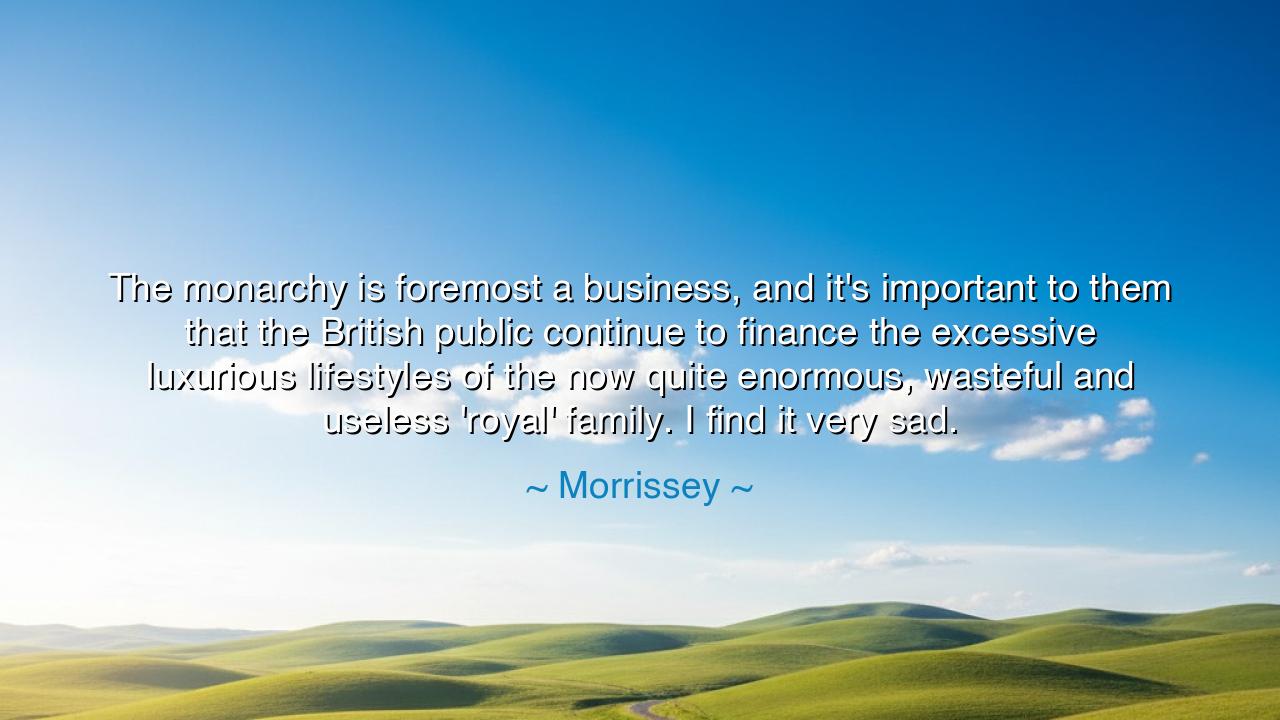
The monarchy is foremost a business, and it's important to them
The monarchy is foremost a business, and it's important to them that the British public continue to finance the excessive luxurious lifestyles of the now quite enormous, wasteful and useless 'royal' family. I find it very sad.






The words of Morrissey, “The monarchy is foremost a business, and it's important to them that the British public continue to finance the excessive luxurious lifestyles of the now quite enormous, wasteful and useless 'royal' family. I find it very sad,” carry the sting of a poet and the lament of a moral philosopher. Beneath the sharpness of his criticism lies not merely anger, but grief for a civilization that has traded meaning for spectacle, and reverence for indulgence. In his words, one hears the sigh of a soul who loves his country deeply yet mourns the way it has chained itself to symbols of excess that once embodied nobility.
In the ancient world, kingship was a sacred duty, not a privilege. The king was seen as a servant of heaven and the guardian of the people. When the ruler became self-indulgent, when he forgot that his crown was not gold but responsibility, the gods withdrew their favor, and empires fell. The same truth echoes through Morrissey’s lament. The monarchy, once born of divine myth and duty, now functions as a business, its purpose shifting from service to survival — not through valor or wisdom, but through the selling of an image. It is not royalty that he condemns, but the hollowness that remains when its spirit dies.
We may look to history for mirrors of this decline. The Roman Empire, in its later days, was filled with emperors who lived in gold halls while the people starved. The games in the Colosseum grew bloodier as the empire’s heart grew weaker — the leaders sought to distract the masses from decay with grandeur and performance. So too does Morrissey’s “sadness” reflect this eternal cycle: when the throne becomes a stage, when ceremony becomes commerce, and when admiration is demanded rather than earned, the soul of a nation begins to wither.
Yet Morrissey does not speak only of monarchy; he speaks of modern society itself — of how easily we become spectators, paying homage not to virtue but to glamour. He sees in the royal pageantry a reflection of the common man’s own surrender: how the people, weary of their own struggle, accept illusion as comfort. He mourns not just the royals, but the crowd that cheers them — a people who once overthrew tyranny but now finance their own servitude, mistaking heritage for holiness, and vanity for pride.
There is, however, compassion in his sadness. He does not rage like a revolutionary but mourns like a disappointed son. His tone is elegiac — not calling for fire and ruin, but for awakening. For behind his bitterness lies a yearning for something purer: a world where those who lead do so with humility, where power is measured not by diamonds but by deeds. In this way, Morrissey stands in the lineage of ancient truth-tellers — like Diogenes, who wandered the streets with a lantern seeking an honest man, or Jeremiah, who wept for the corruption of his beloved Jerusalem.
The wisdom in his words reminds us that every institution, however ancient, must renew its moral contract with the people or lose its legitimacy. When wealth becomes detached from purpose, when reverence becomes performance, when the crown becomes a brand — it is not only the rulers who are impoverished, but the nation’s soul. The sadness Morrissey speaks of is not nostalgia; it is the sorrow of watching meaning dissolve in the waters of indulgence.
The lesson, then, is not rebellion for its own sake, but vigilance of conscience. Whether one lives under a king or a flag, one must never let symbols replace substance. To honor a tradition is not to preserve its form, but to preserve its virtue. Let us learn to question what we worship, to demand that glory be wedded to goodness, and to remember that true royalty is of the spirit, not the blood. For when the people awaken to their own dignity, no crown — however heavy with jewels — can ever outshine them.






AAdministratorAdministrator
Welcome, honored guests. Please leave a comment, we will respond soon